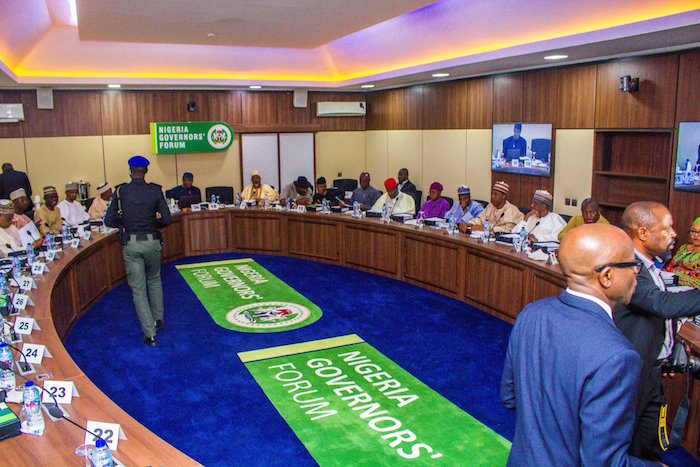The speculated meeting between Governors of the 36 states of the federation and the striking Judicial Staff Union of Nigeria (JUSUN) workers on Wednesday, April 14 may not yield the expected fruit, except governors decide to concede their hard stance on the issue, Straightnews can reveal.
Already, it is rumoured that the Governors are awaiting the return of President Muhammadu Buhari to resolve the imbroglio over the implementation of financial autonomy for state judiciaries.
However, the union also declared that the Chief Justice of Nigeria (CJN), Ibrahim Tanko Mohammad, who met with them earlier to call off the strike cannot give what he does not have, therefore, he cannot meet their demands.
The Monday meeting between the government and JUSUN was called at the instance of the Minister of Labour and Employment, Senator Chris Ngige, and scheduled to commence by 2 pm, but the meeting ended in a deadlock as the strike has now entered Day 9.
A source confided in THISDAY that while the governors were eager to resolve the impasse, which triggered the ongoing strike by judicial workers, they had decided to defer to the president by waiting for him to return from his medical trip to Britain before taking further action on the matter.
The federal government and states have been locked in a war of attrition over the implementation of financial autonomy for state judiciaries.
Although Section 81 (3) and Section 121 (3) of the 1999 Constitution (as amended), grant financial autonomy to federal and state judiciaries, governors have largely ignored the provision.
This has elicited a campaign to free the judiciary in each state from governors’ control, prompting Buhari to go the extra mile by signing Executive Order 10, which mandates governors to put the judiciary and the legislature on the first line charge.
However, the governors, who described the executive order as full of inconsistencies and unconstitutional, impressed it on the president to defer it’s gazetting to allow for talks to resolve the knotty issues on granting financial autonomy to state judiciaries and legislatures.
In another bid to push the enforcement of the financial autonomy policy, the judicial workers and a former President, Nigerian Bar Association (NBA), Dr Olisa Agbakoba, had filed suits in court to challenge the governors’ reluctance to implement the policy.
The courts, in the cases of Judicial Staff Union of Nigeria Vs National Judicial Council (NJC) and Governors of the 36 states in Suit No. FHC/ABJ/CS/667/13; Olisa Agbakoba Vs Federal Government of Nigeria, NJC and the National Assembly in suit No. FHC/ABJ/CS/63/2013; and Olisa Agbakoba Vs Attorney General of Ekiti State and two Others in Suit No. NAD/56/2013, upheld the arguments for financial autonomy for state judiciaries.
But following the failure of the states to implement the financial autonomy, the Judicial Staff Union of Nigeria (JUSUN) has since shut down the courts and embarked on a strike.
The source said the governors were still trying to reach a consensus over the enforcement of the order.
He said the governors had planned to approach the Supreme Court to interpret certain provisions of the order but later shelved the plan in order not to embarrass the federal government.
According to him, a technical report containing the position of the governors has been submitted to the Chief of Staff to the President, Prof. Ibrahim Gambari, while they await the return of the president from the foreign medical trip for a final resolution of the issue.
He confirmed that the governors will meet Wednesday with the striking judicial workers to find a way of ending the strike.
He said the governors would want a consensus approach to the implementation of the executive order to avoid embarrassing the government.
According to him, the governors decided to adopt the approach of negotiation with the federal government so as not to embarrass the federal government at the Supreme Court, adding that certain provisions of the executive order were unconstitutional and inconsistent.
“The Executive Order 10 is full of inconsistencies, contradictions and unconstitutional in nature. We set up a committee. The committee is headed by the Solicitor-General of the Federation. The minister of finance is a member with some governors as members.
“We are almost reaching a consensus on the implementation. We don’t want to embarrass the federal government because of the unconstitutional nature of some of the clauses of Executive Order 10,” the source said.
Highlighting the unconstitutionality of the Executive Order 10, the source said: “For instance, the order mandated the Attorney-General of the Federation to deduct the money from the source, but the Attorney-General has no such powers bestowed on him by the constitution.
The powers to make such deductions are vested in the office of the Accountant-General of the Federation.
“So, under the circumstances, there are some issues that have to be sorted out before a total compliance and implementation,” the source added.
He explained that the governors, operating under the umbrella of the Nigeria Governors’ Forum (NGF), decided not to challenge the order in the court so as not to overheat the polity.
Speaking with journalists at the instance of the Chairman of the NGF and Governor of Ekiti State, Dr. Kayode Fayemi, the Governor of Plateau State, Mr Simon Lalong, said Tuesday that the governors would meet today with all the speakers of state Houses of Assembly, leaders of judicial workers and other stakeholders on how to end the week-long strike.
The meeting is expected to take place in Abuja.
(Straightnews with reports from Thisday)

